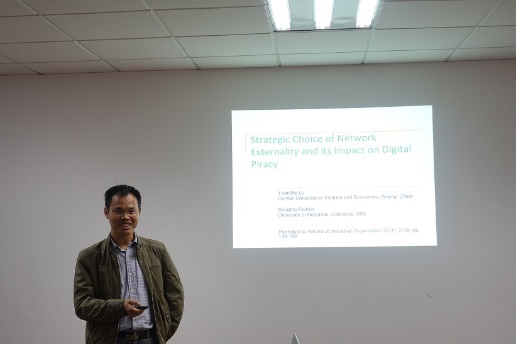EFIT Yukun Huang
On the afternoon of October 19, professor Yuanzhu Lu, the professor from the institute of economics and management, Central University of Finance and Economics, delivered a lecture titled " Strategic Choice of Network Externality and Its Impact on Digital Piracy " at Weiyu building 117. Teachers and some students from the IEF participated in the lecture and subsequent discussion.
The lecture begins with an introduction to research motivation. The competition of enterprises is not only in price and quantity, but also in quality. If enterprises want to improve the quality, they can improve the auxiliary service of the product in addition to research and development, so that the product can be used for higher value. The lecture is to see if the original manufacturer of the product can improve the quality of the product through the second method.
Then, the lecture introduced the concept of network externality. Network externality is the property that the value of the product to users increases with the increase of the number of users. For example, the use of the operating system and apps like WeChat. Mr. Lu gave the example of a Samsung phone he used. While the product itself is of good quality, many common apps cannot be downloaded on the phone using Samsung's own system.
Generally, network externalities are considered exogenous. In this paper, professor Lu takes network externalities as endogenous variables. In addition, the structure and coverage of the market, that is, full coverage or partial coverage are also considered endogenous. It means that the original manufacturer can choose its network externality, its market structure and coverage, while the pirate manufacturer cannot.
Later professor Lu introduced the type of piracy. Generally, there are two types of piracy. One is commercial piracy for profit. The other is the piracy that the Chinese often do, like Office, we just use for ourselves. Usually anti-piracy is done by technical means, or by resorting to intellectual property protection agencies. This paper focuses on another anti-piracy approach, which is to squeeze out pirated products by making them cheaper relative to the pirated ones by improving network externalities.
In the model building part, professor Lu constructed a multi-stage game, and established a model for product quality, market coverage and network externalities. Lu used backward induction method to solve the optimal solution of the original enterprise. It gave the implication of how original producer choose their network externalities, market structure and market coverage.
Finally, professor Lu summarized the content of the lecture. It shows how the original producer by choosing the strength of the network externality can strategically control the market competition. Using the explicit strength of the network externality as tool to fight piracy has never been explored. This work is a contribution in that direction. It also shows if the pirate can adjust its product quality then except for a small interval of network externality, it would lower the quality of its product to survive profitable in the market as the high quality firm strategically increases the degree of network externality.

